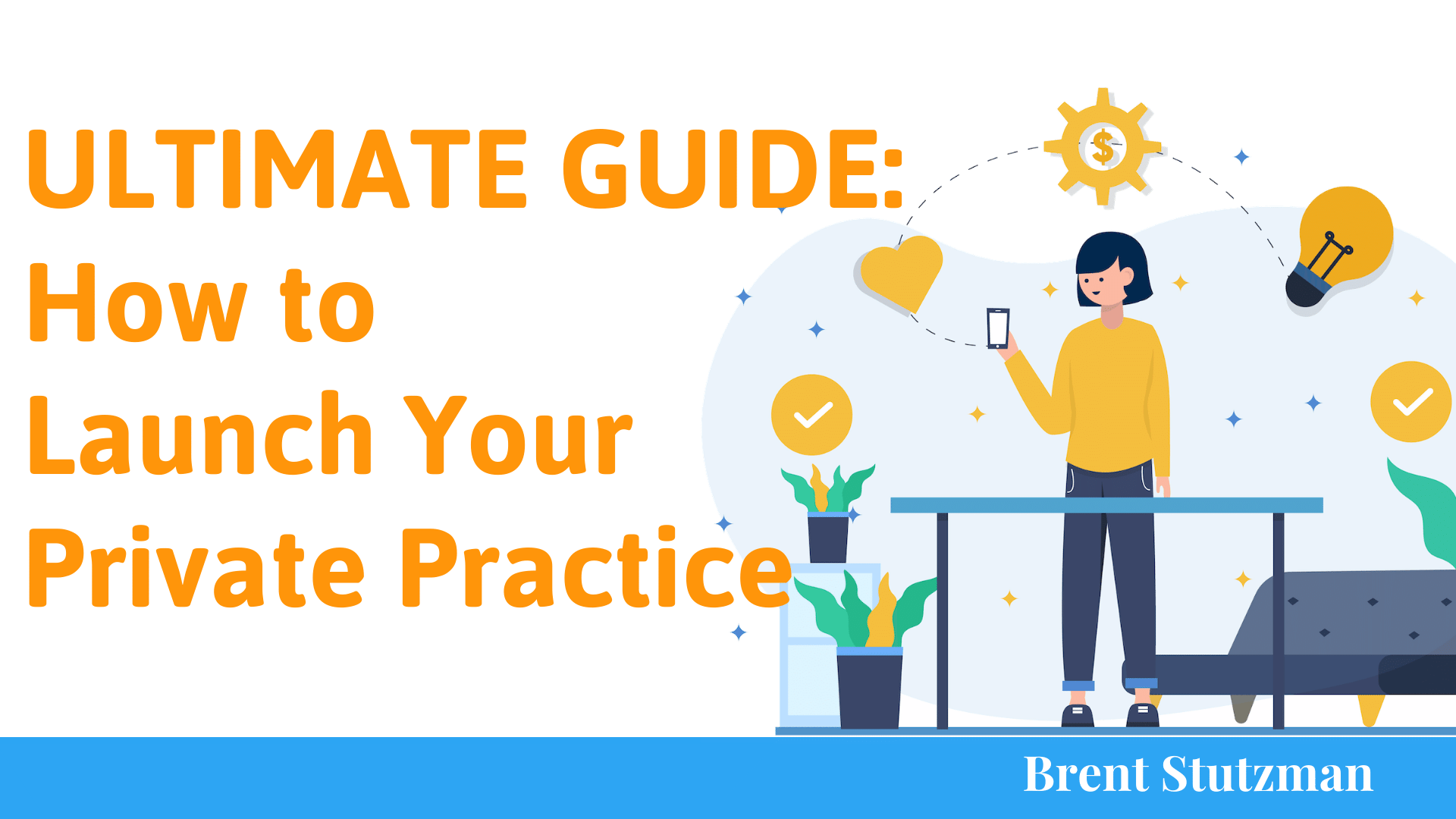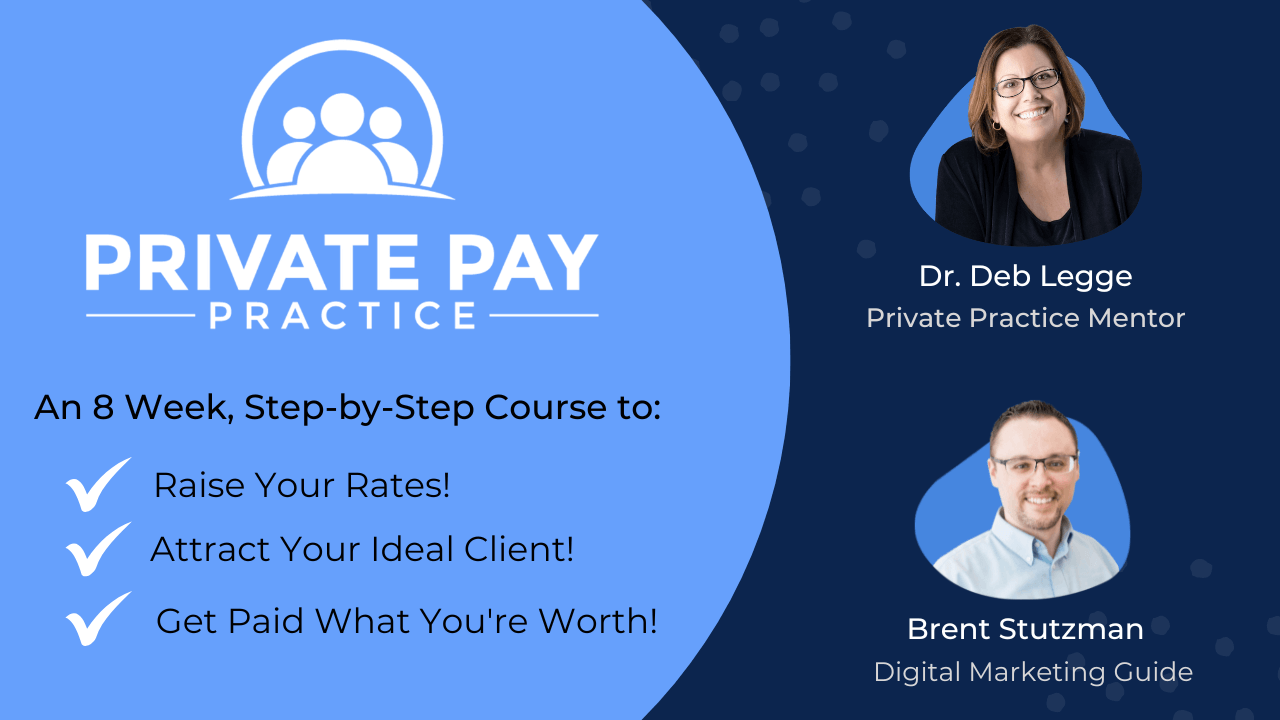Mental health professionals who own a solo practice may also want to expand into a group practice. This could be for many reasons, but, as I’ve interacted and worked with practice owners, their desires, values, and stage of life, may not lend themselves to starting a group practice.
I had a practice owner reach out to me recently and said she was ready to grow her practice. As we started talking, she said, “There’s one big change that’s going to be happening. I’m pregnant with triplets.”
Trying to grow a group practice in her situation may not benefit her personal life at the moment. Being a father of twins, I can guarantee there will be sleep deprivation for at least the next 14 months, and trying to scale a group practice would be near impossible, because scaling a group practice is sort of like giving birth: it needs time, attention, and nourishment.
Paul Jarvis, in his book, “Company of One,” challenges all entrepreneurs around the pursuit of growth. He writes, “A company of one is simply a business that questions growth.”
So, would expanding to a group practice be beneficial to your life right now? Will it help you achieve your personal and professional goals?
To help you answer these questions let’s dive into the 5 reasons why NOT to start a group private practice.
1. You may not want to start a group practice if Your Vision & Values Do Not Align With A Group Practice
The vision that you have for your practice and your personal life should dictate what kind of practice you have.
I’m a firm believer that your business should SERVE your personal goals.
So, have you articulated the goals of your personal life?
Have you articulated the vision for your group practice?
Is your vision something like, “To be the number one private practice serving couples in the Denver suburbs and pay off my house in 10 years.”
Then a group practice may better serve that vision than solo practice.
Or is your vision more, “To provide child therapy services to the community and only work 3 days a week to spend more time with my family.”
A solo practice may better serve that vision than a group practice.
Paul Jarvis, again, in his book, “Company of One,” writes, “Your vision is the lens through which you filter all your business decisions, from the tiny to the monumental.”
So, what is your vision for your practice and your personal life? Does this move you to stay in a solo practice, or expand into a group practice?
This all comes down to understanding your “why” or your vision for your practice which I cover in another podcast and blog post on my website called, “Know Your Why So You Don’t Crash & Burn.”
2. You may not want to start a group practice if You Value Simple Finances
Starting and growing a group practice comes with many complexities that you may not want to deal with. The complexities that you’ll face will be in 3 areas:
- Finances
- Operations
- Marketing
Let’s start with finances. If you’re a solo practice, your expenses are very simple. You have your lease, your office expenses, and utilities, and you only pay yourself. You may even get away with not having a Quickbooks account and just use a simple spreadsheet to track expenses.
When you grow a group practice, your finances become more complex. You’ll have more expenses as it relates to office space and software, including Quickbooks. You’ll eventually need to hire a bookkeeper to keep track of everything because, most likely, you’ll develop financial blind spots. (Believe me, I’ve seen it happen dozens of times with practice owners).
You’ll need to track client payments from your clinicians, as well as insurance reimbursements. You’ll also have greater payroll costs and taxes to pay. You can say “goodbye” to TurboTax because it will no longer help you.
And, this is just the beginning. Someday, you may offer benefits to your team, which you’ll also need to track and administer.
If you’re not feeling overwhelmed by this, then maybe you are cut out to be a group practice owner.
But, if you cringe thinking about all this, you may want to stay a solo practice.
Let’s take a look at operations.
3. You may not want to start a group practice if You Value Simple Operations
Of course, the complexity around how you run your practice grows with a group practice. You’ll be doing less clinical work and more management of people and tasks.
Operations include things like:
- Staff meetings
- Case consultations
- Clinical supervision
- Buying copier paper (or other office supplies)
- 1-to-1 meetings with your clinicians
- Managing employees who have their own complexities
- Managing a Biller
- Managing an Intake Coordinator
- Training on EHR, how to charge clients, and HIPAA compliance
- Creating policy manuals and vacation policies.
You may not want to have a group practice if:
- If you don’t like to manage people & personalities.
- You’d rather do more clinical work vs clerical work.
- And if you’d rather not keep others accountable for their job performance.
So, if you value simplicity as it relates to how you’d like to run your practice, staying a solo practice may be a great fit.
4. You may not want to start a group practice if You Value Simple Marketing
Marketing is crucial for any private practice. But it becomes more complex as you bring on more clinicians.
Most people “shopping” for a therapist shop like they do for Amazon products. They go to Google; do a search for “counselor near me;” they look at the review stars; then they start shopping.
So, what this means for you as a practice owner, is that you need to get Google reviews. Somehow. You need reviews.
You need to make sure you’re showing up on Google for specific keyword searches like, “counselor near me.”
With a group practice, you’ll also be responsible for attracting new clients to your practice to fill up your clinicians’ caseload. So there’s an added responsibility and complexity to your marketing.
So, if you value simple marketing, you may not want to start a group practice.
5. You may not want to start a group practice if You Value Your Brand Power to Command Private Pay
The fifth reason you may NOT want to start a group practice is your ability to command private pay prices.
A solo practice can command higher pricing power for their services. Not in all cases, but in many cases.
It comes down to supply and demand. If there’s a lot of demand for your services, but you are the only supply to meet that demand, your ability to command private pay prices remains strong.
Also, as your brand value grows, so does your ability to raise your rates and even ditch insurance.
There’s also another reason why you can command higher prices for your services, and that’s customer service. People love direct access to the business owner. It doesn’t scale, but it’s an amazing added value.
Imagine if you had access to the CEO of Apple. You could just go to the Apple store and ask Tim Cook, “What’s the best iPhone for my child?” And you could have a conversation with him about it.
The two powerful pricing options you have as a solo practice is scarcity & access. You only have so much of your time and the access they get is YOU.
And, your time is valuable. Isn’t it? How valuable is it? It’s more than you think.
If you have an established trusted brand in your community your ability to remain private pay is high. But, if you do not have a solid brand presence, commanding private pay prices may be difficult. You can still do it, but it takes some time, and it can be a roller coaster of emotions.
So if you cannot stomach that roller coaster of entrepreneurial emotions, you may not want to start a group practice.
Conclusion:
You want to be certain that starting a group practice is what you want to do. But, in order to get to that mindset, you have to know your vision for your business and for your personal life.
So you need to ask, “Can a group practice help you accomplish both?”
Because working with contractors and employees is A LOT of work, marketing and operating a group practice is a skill that you probably haven’t learned yet.
At Brand Your Practice, we focus on helping practice owners start and scale their businesses and our goal is to help the reach revenue of $500,000 or more over the course of 3 years. This will absolutely present complexities around managing people, marketing your practice, and financial practices. But that’s our specialty.
If you’re ready to start your group practice today, reach out to us. We partner with practice owners to make this a reality for them.
And, if you want to craft a simple vision and mission statement to better answer your “why” check out my blog post “Know Your Why So You Don’t Crash & Burn.”
I have a TON of free resources on my website including an updated free “Private Practice Launch Checklist.” I’ve helped launch over 10 practices and this is the launch guide that I use every time we launch a new practice.
Don’t have time to watch? You can also listen to the full episode below!
And to stay up to date on when new episodes air, click here to subscribe!




